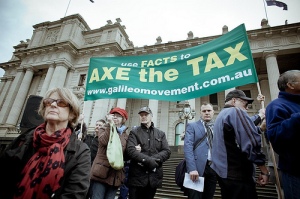
APJC fellows experiment with new information technologies
People working in the international aid area are coming under increasing pressure to justify what they do.
This scrutiny is particularly intense in the area of media development, where organisations delivering training and other programs are asked to show how the work they do actually improves the situation of people in the countries where they work.
The reality is that it is very difficult to show how professional development has an impact. Reasons are:
1. It is difficult to show how professional development programs lead to improved media performance.
2. It is difficult to show how improved media performance leads to improved functioning of society and, more specifically, improved livelihoods for people in the community.
Put simply, it is usually not possible to show how giving this particular journalist a better understanding of how to reporting economic affairs will improve the economic future of this particular young girl growing up in a rural community in East Timor.
Professionals working in this area should not despair. It should be possible to persuade donors of the general value of this work even if specific effects can not be demonstrated.
One important tool for doing this is the professional blog. Blogs provide a unique opportunity to explain the logic and theory of why this development work is almost cetainly going to have impacts even if they can not be measured easily.
The details of this is another topic. At this stage, it’s enough just to raise this idea for discussion.




